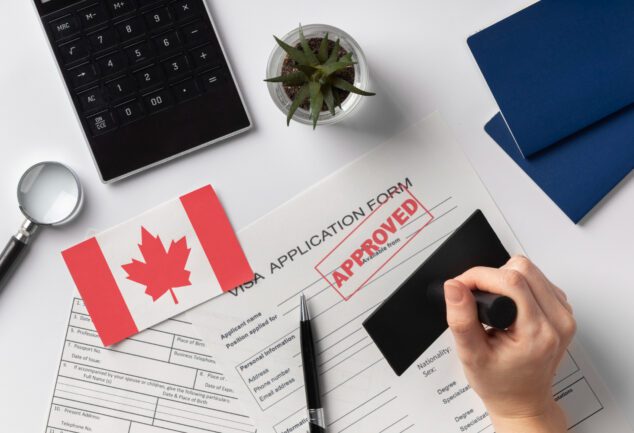Are you planning to visit Canada?
Navigating through the visa regulations can be a daunting task.
Understanding the requirements and procedures can save you time, money, and unnecessary stress.
Whether you are planning a short-term visit or considering a long-term stay, having a comprehensive guide to Canada’s visa regulations is essential.


Canada is a popular destination for tourists, students, and professionals alike. However, the visa application process can be complex and confusing, with various rules and regulations to follow.
Without proper knowledge, you may face delays or even rejection of your visa application.
To ensure a smooth and successful visa application, it is crucial to have a comprehensive understanding of Canada’s visa regulations. This guide will provide you with the necessary information and insights to navigate through the process with confidence.
Whether you are applying for a visitor visa, student visa, or work permit, this article will help you avoid common mistakes and ensure a hassle-free journey to Canada.
What is a Visa?
A visa is an official document that grants permission to individuals from foreign countries to enter a specific country for various purposes, such as tourism, study, work, or residence. It is a form of authorization from the government of the country being visited, allowing the individual to travel to and stay in that country for a designated period of time.
A visa typically includes information such as the purpose of the visit, the duration of stay, and any restrictions or conditions that apply. It is usually a requirement for individuals who are not citizens or permanent residents of a country to obtain a visa before entering.
The specific regulations and requirements for obtaining a visa vary depending on the country being visited and the purpose of the visit.
Types of Visas
Canada offers various types of visas for individuals intending to enter the country. Among the frequently sought-after visas is the Canada Visitor Visa, necessary for tourists and those visiting friends or family in Canada.
To apply for a Visitor Visa, applicants need to submit essential documents such as a valid passport, evidence of financial support, a letter of invitation (if applicable), and a completed application form.
For those interested in studying in Canada, the Canada Student Visa is the appropriate choice. This visa allows international students to pursue their education in Canada.
Along with a valid passport, students must provide a letter of acceptance from a recognized Canadian educational institution, proof of financial support, and a completed application form.
The Canada Work Visa is available for individuals seeking employment opportunities in Canada.
To be eligible, applicants must have a job offer from a Canadian employer, a valid passport, proof of qualifications, and a completed application form.
For parents and grandparents of Canadian citizens or permanent residents, the Canada Super Visa is an option.
This visa allows parents and grandparents to visit Canada for extended periods of time. Along with a valid passport, applicants must provide proof of financial support, a letter of invitation, and proof of relationship.
Lastly, the Canada Business Visa is designed for individuals who wish to conduct business activities in Canada.
Along with a valid passport, applicants must provide proof of business activities, financial documents, a letter of invitation (if applicable), and a completed application form.
Canadian Passport Regulations
Introduction to Canadian Passport Regulations:
Canadian Passport Regulations are a set of guidelines and requirements issued by the Government of Canada for individuals who wish to obtain or renew their Canadian passport.
A valid passport is a vital travel document that allows Canadian citizens to travel internationally and serves as proof of their citizenship and identity. It is essential for Canadian citizens to understand the various regulations regarding passport application, renewal, and travel restrictions to ensure a smooth and hassle-free travel experience.
These regulations cover important aspects such as the application process, required documents, fees, validity periods, and travel advisories.
By adhering to the Canadian Passport Regulations, individuals can ensure that they possess a valid and up-to-date passport, enabling them to travel abroad and return to Canada without any issues.
Requirements for Obtaining a Canadian Passport
Getting a Canadian passport is a simple procedure, involving specific documents and adherence to certain guidelines. To apply for a Canadian passport, applicants must be Canadian citizens and provide evidence of their citizenship.
The necessary documents include a duly filled application form, two identical passport photos taken within the last six months, proof of Canadian citizenship (such as an expired or current Canadian passport, a birth certificate, or a citizenship certificate), and a valid identification document.
Once all the necessary documents are gathered, individuals can submit their application in person at a passport office or by mail. The current processing time for a Canadian passport is approximately 20 business days for a standard application.
It is important to note that passport validity and immigration requirements may vary depending on the applicant’s country of residence or travel plans.
More information about the specific requirements and application process can be found on the official website of the Government of Canada.
Renewing or Replacing a Lost or Expired Canadian Passport
Renewing or replacing a lost or expired Canadian passport is a straightforward process. Individuals can begin by contacting their nearest Canadian embassy or consulate to obtain the necessary forms and instructions.
The embassy or consulate will provide guidance on how to proceed with the passport renewal or replacement.
To renew a Canadian passport, individuals will typically be required to submit a completed application form, proof of Canadian citizenship, and two identical passport photos. The application form can be obtained from the embassy or consulate or can be downloaded from the official government of Canada website.
Proof of Canadian citizenship can include a previous Canadian passport, Canadian birth certificate, or certificate of Canadian citizenship. It is important to check with the specific embassy or consulate for any additional requirements or specific instructions regarding renewing or replacing a lost passport.
By following these steps and gathering the necessary documents, individuals can ensure a smooth process in renewing or replacing their Canadian passport.
Travelling with a Minor and their Canadian Passport
When accompanied by a minor holding a Canadian passport, there are specific documentation obligations that must be fulfilled. Firstly, the minor should possess a valid Canadian passport, and it is essential to check that it is not close to its expiration date to avoid travel disruptions.
Additionally, carrying supplementary documentation, such as a birth certificate or a letter of consent from the non-traveling parent, is recommended. These documents help establish the minor’s relationship with accompanying adults and prevent any potential immigration-related problems during the journey.
To ensure the validity of the Canadian passport for the minor, parents or guardians should regularly check the passport’s expiration date. It is recommended to renew the passport at least six months before its expiry, as some countries may require this validity period.
Furthermore, parents and guardians should familiarize themselves with any regulations or guidelines specifically applicable to minors travelling to Canada. These may include additional requirements for unaccompanied minors, such as a notarized letter of authorization from the parent or guardian, or proof of custody in cases of separated or divorced parents.
Adhering to these regulations will help ensure a smooth and hassle-free travel experience for both the minor and their accompanying adults.

A Comprehensive Guide to Language and Culture in Canada

A Comprehensive Guide to Surrey Immigration
Entry Requirements to Canada for Citizens from Visa-Exempt Countries
Before traveling to Canada, it is essential to be aware of the entry requirements for citizens from visa-exempt countries. Canada provides visa exemptions to eligible citizens, enabling them to visit the country for tourism, business, or transit purposes without obtaining a visa in advance.
However, meeting specific criteria and possessing the required documents are crucial to being granted entry into the country. Here are the essential entry requirements for citizens from visa-exempt countries planning to visit Canada.
Who is Considered a Visa-Exempt Foreign National?
Visa-exempt foreign nationals are individuals who are eligible to enter Canada without the need for a visa. There are several categories of individuals that fall under this classification. One category is those who hold an Electronic Travel Authorization (eTA).
This is a requirement for visa-exempt foreign nationals traveling to or transiting through Canada by air. Another category is U.S. citizens, who are allowed to enter Canada for tourism, business, or to study for up to six months without a visa.
In addition, permanent residents of Canada, also known as landed immigrants, do not require a visa to enter the country. They only need to present their permanent resident card or travel document issued by the government of Canada.
Lastly, foreign nationals who enter Canada via overland entry, such as by car or train, may be exempted from requiring a visa. However, it is important to note that while these individuals may not need a visa, they must still meet certain entry requirements, such as possessing a valid passport and being able to demonstrate the purpose of their visit.
Documentation Needed to Enter Canada as a Visa-Exempt Foreign National
Visa-exempt foreign nationals who wish to enter Canada must have certain documentation in place. One of the key requirements is the need for an Electronic Travel Authorization (eTA). This is mandatory for visa-exempt individuals traveling to or transiting through Canada by air.
The eTA is an online application that confirms the individual’s eligibility to visit Canada. However, there are exemptions for individuals who already possess a valid Canadian visa or permanent resident card.
In addition to the eTA, visa-exempt foreign nationals must also provide proof of a clean criminal record. This means they must demonstrate that they have no criminal convictions or charges pending, which could pose a threat to Canadian security.
Moreover, individuals may be required to undergo a medical examination to ensure they do not have any communicable diseases or medical conditions that could affect public health in Canada.
Lastly, visa-exempt foreign nationals must demonstrate their financial means during their stay in Canada. This can be done by providing evidence of sufficient funds to cover travel expenses, accommodation, and other essential expenses.
Showing proof of financial stability helps ensure that visitors can support themselves without becoming a burden on Canadian resources.
It is important for visa-exempt foreign nationals to carefully review the documentation requirements before entering Canada to ensure they have the necessary paperwork and comply with the country’s regulations.
Travel Advice for All Foreign Nationals Entering Canada
Travel advice for all foreign nationals entering Canada includes specific requirements and recommendations to ensure a smooth and safe entry into the country. Currently, Canada does not have any mandated COVID-19 testing or vaccination requirements for travelers.
However, it is important to note that the situation is subject to change, and it is advisable to stay updated on any updates or changes in travel advisories.
Foreign nationals should also prioritize their health and the health of those around them. It is crucial to avoid travel to Canada if experiencing any symptoms of illness, including fever, cough, or difficulty breathing.
If symptoms develop during travel, it is advisable to seek medical attention and follow the guidance provided by healthcare professionals. By adhering to these guidelines and staying informed about travel advisories, foreign nationals can have a smooth and safe entry into Canada.
Entry Requirements to Canada for Citizens from Non-Visa Exempt Countries
Traveling to Canada involves meeting certain entry requirements, especially for citizens from non-visa exempt countries. These regulations are in place to ensure the safety and security of both the visitors and the country itself.
It is crucial for travelers to understand and comply with these entry requirements to have a smooth and hassle-free journey. This article aims to provide an overview of the entry requirements for citizens from non-visa exempt countries to Canada.
Entry Requirements for Citizens from Non-Visa Exempt Countries:
Citizens from non-visa exempt countries are required to obtain a visa before traveling to Canada. The first step is to have a valid passport, with an expiration date that extends beyond the duration of the intended stay. The next requirement involves applying for a Canadian visa, which can be done online or through a visa application center.
Applicants will need to provide necessary documentation, such as proof of purpose of visit, financial resources, and a letter of introduction, among others. It is essential to ensure that all documents are accurate and up-to-date to avoid any delays or complications in the application process. Once the visa is granted, travelers can proceed with their travel plans to Canada.
It is important to note that having a visa does not guarantee entry into the country as the final decision lies with the Canada Border Services Agency (CBSA) upon arrival. Therefore, it is advisable to have all relevant travel documents readily available for presentation. By adhering to these entry requirements, citizens from non-visa exempt countries can enjoy their visit to Canada without any hindrances.
What is the Difference Between a Resident Card and an Immigration Visa?
A Resident Card and an Immigration Visa are both documents that allow foreign nationals to live and work in Canada, but they have distinct purposes and eligibility requirements.
A Resident Card, also known as a Permanent Resident Card, is issued to individuals who have obtained permanent resident status in Canada. It serves as proof of their status and allows them to return to Canada after traveling abroad.
To be eligible for a Resident Card, individuals must meet specific residency requirements, such as physically residing in Canada for a certain period of time.
On the other hand, an Immigration Visa, also known as a Temporary Resident Visa, is issued to individuals who want to come to Canada for a temporary period, such as for work, study, or visiting family. The eligibility requirements for an Immigration Visa are different from those of a Resident Card and depend on the purpose of the visit.
For example, individuals applying for a work visa may need a job offer from a Canadian employer, while those applying for a study visa must have an acceptance letter from a Canadian educational institution.
The Resident Card provides several benefits for permanent residents, including the ability to live, work, and study anywhere in Canada, access to healthcare and social benefits, and the opportunity to apply for Canadian citizenship.
However, it also comes with limitations, such as the requirement to maintain permanent residency by meeting residency obligations.
The Immigration Visa, on the other hand, allows temporary residents to visit or reside in Canada for a specific period. It grants them the right to travel in and out of Canada but has limitations on the duration of stay and the ability to work or study without additional permits.
To obtain a Resident Card, individuals need to submit an application along with supporting documents, such as proof of status and residency. The application process for an Immigration Visa includes completing an application form, providing necessary documentation specific to the purpose of the visit, and paying the application fees.
It is crucial to submit accurate and complete applications to avoid delays or possible rejections.
Both the Resident Card and the Immigration Visa require individuals to maintain valid status in Canada. Failing to comply with immigration regulations, such as not meeting residency requirements for permanent residents or staying beyond the authorized period for temporary residents, can lead to serious consequences, including deportation and future immigration restrictions.
It is important for foreign nationals to understand and comply with these regulations to maintain their legal status and enjoy a fulfilling stay in Canada.
How do I Apply for an Immigration Visa?
To apply for an Immigration Visa in Canada, there are several important steps and requirements to consider. First, it is crucial to consult the Travel Advice and Advisories provided by the Government of Canada to gather destination-specific visa information.
This ensures that you have the correct and up-to-date information before starting the application process.
Next, it is essential to have a valid and eligible passport with empty visa pages. This passport will serve as your travel document and must remain valid throughout your stay in Canada. Additionally, meeting specific visa criteria, such as COVID-19 vaccination status, is necessary.
As part of the application process, you may be required to provide proof of vaccination or other health-related documentation to enter Canada.


Once you have gathered all the necessary information and documents, you can start the application process by completing the required application form and paying the applicable fees.
It is important to ensure that all information provided is accurate and complete to avoid any delays or potential rejections. By following these steps and meeting the necessary requirements, you can successfully apply for an Immigration Visa and make your temporary stay in Canada possible.
Processing Times and Costs Associated With Immigration Visas
Processing times and costs are important factors to consider when applying for immigration visas to Canada. The processing times for immigration visas can vary depending on the type of visa being applied for and the country of the applicant.
It is recommended to check the official government website for the most up-to-date information on processing times.
In terms of costs, there are several fees involved in obtaining an immigration visa. These fees can include application fees, which are non-refundable and must be paid upfront when submitting the application. Additionally, there may be additional fees for services such as biometrics, which are required for certain types of visas.
It is important to budget for these costs and be prepared to pay them in order to complete the application process. It is advised to check the official government website for the current fee schedule and any additional fees that may apply.

What is the Easiest Way to Immigrate to Canada?

Understanding Canada Visa Regulations: A Comprehensive Guide
Additional Documentation Required For Entry Into Canada From Non-Visa Exempt Countries
When traveling to Canada from a non-visa exempt country, there are several additional documents that are required for entry into the country. These documents serve to demonstrate one’s eligibility and intention to comply with the immigration regulations.
The key documents include a valid passport, appropriate visa application form, proof of paid visa fees, clean criminal record, medical examination results, photographs, proof of financial means, proof of intention to return to the home country, identity and civil status documents, cover letter explaining the purpose of travel, and a letter of support or invitation to Canada.
A valid passport is the first and foremost requirement for entry into Canada. The appropriate visa application form must be filled out correctly and completely, ensuring that all necessary information is provided. Proof of paid visa fees is also required to show that the applicant has fulfilled the financial obligation.
It is vital to have a clean criminal record, as any relevant criminal history can affect the outcome of the visa application. Medical examination results may be necessary to ensure the applicant’s health and admissibility.
Additionally, providing photographs, proof of financial means, proof of intention to return to the home country, identity and civil status documents, a cover letter explaining the purpose of travel, and a letter of support or invitation to Canada can strengthen the application and increase the chances of approval.
Ensuring the availability and submission of these additional documents is crucial for non-visa exempt travelers to gain entry into Canada. It is recommended to carefully review the specific requirements of the visa application process and to consult with the appropriate Canadian authorities or embassy for the most accurate and up-to-date information.
In conclusion, navigating Canada’s visa regulations may seem daunting, but with the right information and guidance, it can be a smooth and rewarding process. Whether you are planning to study, work, or immigrate to Canada, understanding the visa regulations is crucial.
Remember, Canada is known for its welcoming nature and diverse opportunities, so don’t let the paperwork deter you from pursuing your dreams.
With determination and the right resources, you will soon find yourself embracing the beauty and opportunities that Canada has to offer.


